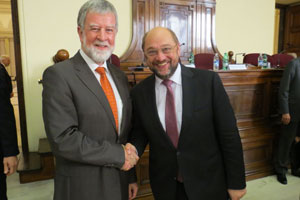
Representing Caritas Internationalis, Justin Kilcullen, and Martin Schulz, President of the European Parliament (Right).
Caritas Internationalis and the EU Embassy to the Holy See sponsored a public debate Friday 11 October with Martin Schulz, President of the European Parliament and Caritas Internationalis representative Justin Kilcullen.
By Martina Liebsch
On one hand, there was the perspective of the poorest and most excluded in the poorest regions of the world and the plea for accountability of politicians and governments.
On the other hand, the EU perspective, where a politician has to satisfy the interests of those who had been living a good life but now feel hopeless because of the economic crisis.
“Poverty is a failure of politics,” said Justin Kilcullen, Executive Director of Trócaire (Caritas Ireland), highlighting climate change, the exclusion of women and lack of accountability in governments as symbols of our collective inaction. (Full Speech)
“Failure to end world poverty and social exclusion is not due to a lack of resources, rather it is a lack of political will,” he said.
On climate change, he recalled a recent visit to communities in Uganda struggling to survive: “The reality is that a European citizen produces almost exactly one hundred times the carbon dioxide emissions as a Ugandan citizen.”
He said that due to EU regulations on carbon emissions, there are targets to replace carbon based fuels with bio fuels. This has seen huge areas of Northern Uganda bought up by multinationals to grow bio fuels like African palm.
“Deals done behind closed doors between companies and governments, result in small holders being driven from their lands as large plantations are established,” he said.
Citing the Millennium Development Goals, a series of government promises for action on anti-poverty, he said, “These commitments included increasing development aid and ending tied aid, finding new and innovative ways of funding development, resolving the debt problem, changing international trading regulations to benefit the poorest countries…”
Instead development aid has fallen, there has been no creation of innovative funding, trade negotiations have been on hold after 12 years and subsidies for agricultural products in the wealthy countries continue to distort the market in favour of the rich.
Justin Kilcullen said to overcome poverty and to enable people to participate fully in all that concerns their lives, we need to reform those structures that cause the marginalisation and alienation in the first place.
“We have to engage as a whole society to hold politicians accountable, to overcome the lack of political will,” he said.
Decent life, for Martin Schulz, means being sure that what someone is doing will also bear fruit for the next generation. Referring to Italy, one of the biggest economies in the world, there are regions with a 50 percent unemployment rate.
This is happening at the same time of enormous speculations on the international financial market.
“We are living in a time of capitalism driven by speculation. The first step is to come to a common understanding that we can speculate about everything, but we must not. We should limit it,” he said.
The fight against poverty, he said, means giving access to credits to small and medium enterprises, those who create most of the jobs and often are carriers of innovation. However they have to fight against high interest rates. Without investment in the real economy there is no growth, with no growth no jobs, with no jobs no hope.
Referring to austerity measures, which are seen as a “recipe” against the economic crisis, he tried to balance the need for budgetary discipline and at the same time investing in social capital.
“We need to invest now in social capital, especially through education and vocational training for new generations,” he said. “On the other side, future generations should not pay for our sovereign debt. Reduce sovereign debt is a question of solidarity between generation.”
He said, “We need to finish the hypocrisy the EU is practicing, of hailing at change in developing countries, like the Arab Spring, while cutting back on domestic budgets, namely development aid.”
The debate reflected that in many countries, poverty is a question of life and death and in others a question of maintaining decent standards for the broad population. How we can we bring together these apparently existing different levels of poverty?
For Justin Kilcullen, “We need leaders of vision and courage who call upon all of us, the citizens of the world, to ensure the gifts of creation are protected and developed for the common good.”
Martina Liebsch is director of Advocacy and Policy at Caritas Internationalis
